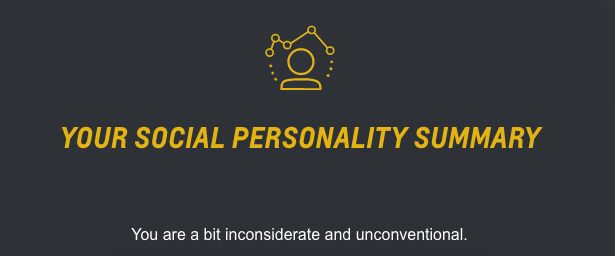

As part of Chevrolet’s new campaign, if you’re willing to let IBM’s Watson analyze your personality through your social media accounts, you can find out how much free gas you deserve.
Watson shot to fame in 2011 when it competed against two of the top Jeopardy! contestants in a showdown. It won without breaking a cold, robotic sweat.
Now, Chevrolet is using Watson’s abilities to analyze your tweets and statuses to determine how positive a person you are. In an ad, Chevy shows customers at three gas stations across the world–in Buenos Aires, New Orleans, and Cape Town–buying gas with their positivity.
For everyone who doesn’t live in those three cities, though, there’s another option. You can take the positivity test online and Watson will let you know how positive you are.
Out of curiosity, I linked both my Facebook and Twitter accounts. My scores weren’t great (I already knew I was kind of a bummer), but I was surprised there was such a large gap between the two.

I scored 89 out of a possible 200 thanks to my tweets. But when I did the same test with my Facebook statuses, I scored a dismal 72 points. Apparently I’m much more negative on Facebook, perhaps because I use it to complain about New York City in general, while my tweets tend to focus more specifically on the city’s annoying, though tolerable, puddles.
Craig Daitch, a spokesperson for Chevrolet, said in an email to Popular Science that they expect the average score to fluctuate as new submissions come in. The average is currently hovering around 120, he said. I’m well below that, glaring slightly at all those more positive people.
Watson will also give you a summary of your social personality. Despite the difference in scores, Watson determined from both Facebook and Twitter that I’m a bit inconsiderate, which I consider an understatement, and authority-challenging, which I resent on principle.

Watson’s natural language processing abilities allows it to read text and use contextual clues to determine what’s actually being said. In particular, Chevy’s campaign is using two technologies, AlchemyLanguage and Personality Insights, Steve Abrams, the director of the Watson Development Program, told Popular Science via email. AlchemyLanguage judges the sentiment of what you’ve written–“I am happy” versus “I am not happy” versus “I am very happy”–and then Personality Insights strings all your communications together to infer a picture of what kind of person you are.
Though it doesn’t always get it right, in my case. It didn’t always pick up on a sarcastic tweet or a grumpy status posted in jest, but overall it separated my positive and negative posts with accuracy.
And it turns out, my 17-point difference isn’t necessarily anything to be worried about. It’s just related to how people use different platforms, Abrams said. More people use Facebook for things like sharing life events like birthdays, weddings, and positive memories, and reserve Twitter for sharing news and customer service issues, which can explain variations in scores. Though that still doesn’t explain why I’m grumpier on Facebook than on Twitter.
Correction (9/15/16, 9:35 p.m. ET): The original story misstated that Watson competed on Jeopardy! in 2009. It should have been 2011 and has been corrected. Our bad!
